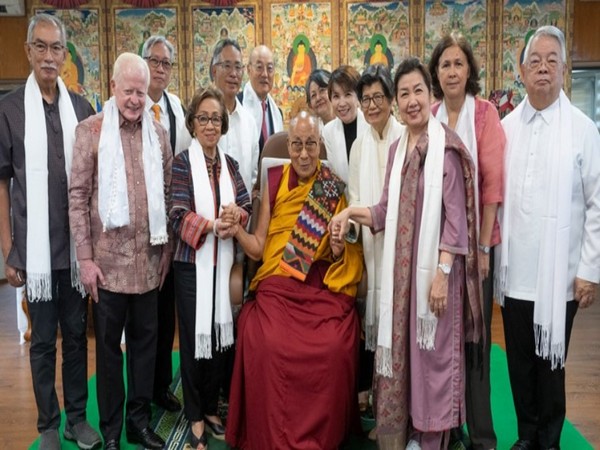President of the Ramon Magsaysay Award Foundation on Wednesday launched a seven-volume series titled “Greatness of Spirit” to commemorate the 65th anniversary of the award presented to Dalai Lama during a meeting at his residence in Himachal Pradesh’s Dharamshala.
The Board of Trustees of the Ramon Magsaysay Award Foundation (RMAF), based in Manila, in the Philippines, launched a seven-volume series entitled Greatness of Spirit about previous recipients of the award in the presence of Dalai Lama, according to the official website of Dalai Lama.
Notably, Dalai Lama was one of the earliest recipients when he was granted the award in 1959 and it was the first international award that he received. The Ramon Magsaysay Award celebrates the best of humanity, embodying the true essence of ‘Greatness of Spirit’.
Susanna B Afan, President and Cecilia L Lazaro, Chairperson of (RMAF) met Dalai Lama at the door to the audience hall and escorted him to his seat. Afan reminded Dalai Lama that she came to Dharamsala last year to present him the medal that they had been unable to physically present to him 65 years ago.
This year, Afan was accompanied by six Ramon Magsaysay Award Laureates, the Board of Trustees and friends. She introduced some awardees from India–Aruna Roy, TM Krishna, Harish Hande, Anshu Gupta–and Conchita Carpio Morales from the Philippines, as well as the Board of Trustees past and present.
Addressing the representatives of the Ramon Magsaysay Award Foundation, Dalai Lama spoke about his life and said, “I was born in the north-eastern part of Tibet in a very remote part of Amdo. Then, when I was about three or four years old, I came to Lhasa in Central Tibet, which is where I began my studies of Buddhist philosophy, logic, and so forth. My teachers were brilliant. Once I had completed my formal studies in 1959, I took the examinations for the Geshe degree.”
Further elaborating about his experience in India, Dalai Lama said, “When circumstances in Tibet changed, I had to flee into exile in India. Here I was able to meet people from many different walks of life and I found that what I had learned in Tibet was very beneficial. Along with Buddhist philosophy, I also studied the views of other Indian schools such as the Samkhyas, Vaisheshikas and so forth. Here, in India, I was able to meet with people who upheld these various views. In addition, I was able to meet and hold discussions with modern scientists from the West.”
He added, “Besides this, I consider India’s ancient principle of non-violence to be very precious. There may be differences of view between the various schools of Indian philosophy, but they all have non-violence in common. I have been familiar with this practice since I was a child. So, while I observe the practice of non-violence in my day-to-day life, I also share it with my friends. I encourage them to incorporate non-violence into their own lives.”
Meanwhile, a day earlier, Tibetans-in-exile commemorated the 64th anniversary of ‘Democracy Day’ in Dharamshala and highlighted the significance of the day in establishing democracy for Tibetans.
The day marks the inception of the Tibetan democratic system in exile. On this day, the Tibetan parliament-in-exile was established in 1960 following the arrival of the Dalai Lama and 80,000 Tibetans in exile in Dharamshala.-ANI



